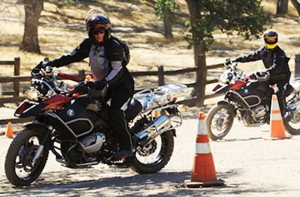 Motorcycle Magazine published an intriguing piece from longtime rider and author Lee Parks, regarding the amount of training the average biker receives before being given his enhanced license. Parks makes the case that the current training environment in the U.S. is insufficient given the number of deaths among bikers every year.
Motorcycle Magazine published an intriguing piece from longtime rider and author Lee Parks, regarding the amount of training the average biker receives before being given his enhanced license. Parks makes the case that the current training environment in the U.S. is insufficient given the number of deaths among bikers every year.
According to statistics cited by Parks, the average motorcycle rider is 33 times more likely to die in a motor vehicle crash than his car-driving counterpart is. Despite the fact that motorcycles account for less than 1% of the total miles driven on American roads, bikers account for about 20% of the total deaths resulting from traffic accidents. Parks makes a compelling case that much of this is due to current training standards and methods.
Making It Easy
In an attempt to introduce more people to the motorcycle culture, the industry undertook a concerted effort back in the late 60s and early 70s to make it as easy as possible to access motorcycle training. Over the decades, this strategy has manifested itself in a number of ways:
- large class sizes
- greater tuition assistance
- government incentives to encourage training.
Parks insists that we have made training so easy that it invites people who are really not serious to take up motorcycle riding as nothing more than a hobby. Such a casual attitude may be one of the causes of carelessness on the roads. It is a reasonable argument, though one that might be difficult to prove statistically.
Insufficient Training
Another problem is that the training required in some states is virtually nonexistent. For example, new riders in Florida can complete a basic rider course in under 20 hours. That course meets the requirements for a motorcycle endorsement. No further training is legally necessary.
Furthermore, according to Parks, some states allow training providers to award a license endorsement without the student ever having to take a road test with a state examiner. The rationale behind this is one that suggests motorcyclists have to have a full car license before prior to beginning their training, so they should already be familiar with road safety issues. However, does it make sense to award an endorsement to someone with fewer than 20 hours training and no state scrutiny?
Parks offers a number of additional pieces of evidence to suggest motorcycle training in the U.S. is currently deficient. Whether or not America's bikers will agree with him is a matter of debate. However, one thing is beyond argument: the number of motorcycle fatalities in this country is far too high.
Riding a motorcycle is intrinsically more complicated and challenging than operating a car. It is in the best interests of bikers to make sure they undergo advanced training before taking a bike out on the road. Remedial training every couple of years is not a bad idea either, especially in regions where bikes can only be used for a few months of the year.


